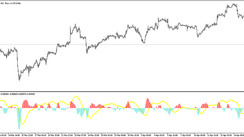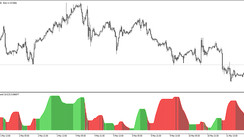Today, almost anyone knows what cryptocurrencies are. Just a couple of years ago, the Bitcoin used to be known by few enthusiasts, and the collapse of the crypto market was forecast loudly and uniformly every year. Today, the crypto industry is developing so fast that it attracts attention of investors from every corner of the world. Colossal volatility and the opportunity to make extreme profits make the market noticed. Lots of various instruments, products, and services have appeared to give us a way of making money.
Anyway, there are two main options of trading crypto: via an exchange and via a broker. These two methods have quite a lot of differences that are not obvious to the public. In this article, we will discuss both trading in an exchange and on a broker's online platform. This is meant to help you conclude, which way of trading suits you best.
Registration and verification
Crypto exchange
Some major exchanges are not registering new users now, however, at those exchanges where registration is open, it is no more complicated that on any other website. You need to provide your email address, invent a password, confirm your registration through a letter from the exchange — and here you are, this is it. Upon registering, you identity must get verified for you to be able to deposit and withdraw funds. For this, you will need to upload a scan of your ID document and a selfie (your face with the provided document).
Verification normally takes several hours to several days. Also, in certain cases you do not have to verify your identity at all: for example, in the popular Binance exchange, you can deposit your account and even withdraw funds right away — no more than 2 BTC a day, though. If you plan to work with larger sums, you will need to get verified, anyway.
A screenshot of the registration form at Binance
Broker
Registration at a broker is no more difficult, and the procedure is the same. However, verification is compulsory before you deposit your first funds and start trading. As a rule, you have to provide 1-2 documents that confirm your identity and country of dwelling. Requirements might differ depending on the jurisdiction. The verification itself normally takes significantly less than in an exchange — within 30 minutes. When it is complete sucessfully, and your deposit is open, you can pour in money and start trading.
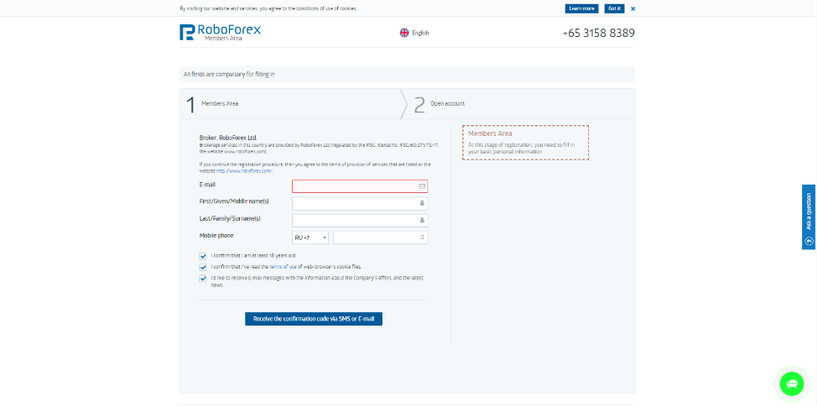
A screenshot of the registration form at RoboForex
Fund depositing and withdrawal
Crypto exchange
Not all exchanges allow depositing fiat money. However, Binance, for example, has recently added this option. Anyway, do not forget about commission fees for depositing that might be rather unsatisfactory. If a crypto exchange does not accept fiat money, you will have to exchange your capital for crypto and then deposit your account. When you make several operations, mind that each will be charged by a certain commission fee, so that your deposit might lose 15-20% on its way.
Withdrawal of fiat money from crypto exchanges goes in the opposite direction. You can use various payment systems, multiple online currency exchanges; however, this way of money withdrawal also presumes large commission fees. Money withdrawal to a banking account can also be hindered. Not all banks are ready to accept crypto from exchanges because not always they admit such income as lawful and well-based.
Broker
Unlike crypto exchanges, accounts at a broker are quite easy to deposit. You are normally provided with various depositing options, including bank cards, popular payment systems, bank transfers, etc. You can deposit funds in RUB, USD, EUR, or crypto. This makes money depositing way easier; moreover, no fees are normally charged.
As for money withdrawal, here as well brokers offer much better conditions. Instead of a 5-6% commission fee at crypto exchanges, brokers charge 0 to 3% for money withdrawal, depending on the type of your account.
Trading crypto
Crypto exchange
Trading crypto at an exchange is rather easy. Choose your trading instrument, open the chart, and keep an eye on it. You can place buying/selling orders and Stop Losses. In this regard, a crypto exchange is inferior to average brokers that provide many more functions at their platforms.
One advantage of crypto exchanges is a vast number of available coina. For example, Binance that we have already mentioned offers over 740 cryptocurrencies, allowing you to choose among a whole range of strategies as well.
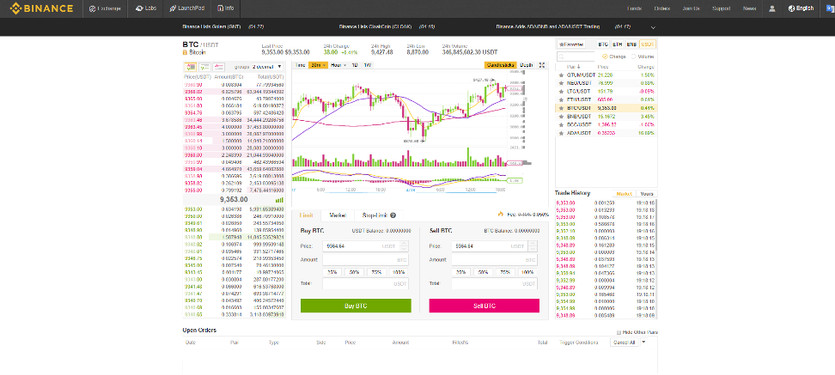
A screenshot of the trading center at Binance
Broker
Working with a broker, you get access to an extended range of functions for more detailed analysis of trading strategies and risk estimation. The terminal lets you install additional indicators and use built-in instruments of tech analysis. However, it cannot boast as many cryptocurrencies as an exchange has. Each broker will have different offers in crypto.
The advantages of trading at a broker include low spreads in crypto instruments. In this market, they can actually reach hundreds of dollars. However, the spread in BTC/USD in the R Trader terminal is one of the lowest in the market — from 0.01 points.
Another advantage is a more advanced selection of functions in terminals. Unlike in an exchange, you can set several charts for monitoring at once, track a fast flow of quotations, use groups of indicators and other improvements, enhancing your professional performance.
For example, R Trader features a free automatic constructor of trading ideas. With it, you can create trading bots, increasing the efficacy of your trading.
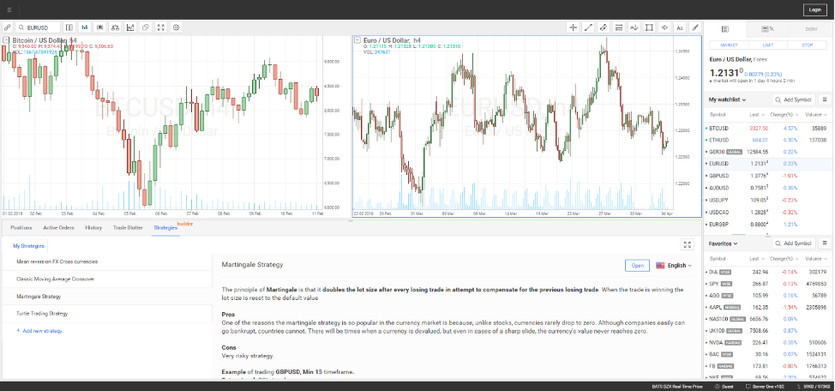
A screenshot of the R Trader terminal
Safety of funds
Crypto exchange
The safety of crypto exchanges is at a quite low level. Sure, you can think of a complicated password to your account and switch on two-step authentification, but nothing will guarantee safety of your assets. Each of existing exchanges has safety issues on various levels, that is why there overall trustworthiness is hard to evaluate.
Recently, we have been hearing about this or that exchange being hacked rather often. Totally, investors lost about 700 million USD this year due to such attacks on two large exchanges (BitGrail and Coincheck). Also, it is not a rare case when the organizers of an exchange invent fraud schemes and then try to hide them. In this regard, trading in the crypto market is the riskiest of all because it is regulated in no way, hence, is more vulnerable.
Broker
Trading crypto at a licensed broker gives you certain guarantees. Firstly, the fact that your broker has been approved by one of such reliable regulators as CySEC, FCA, SEC, etc. means that, at least, the company is not a fraud organization. Secondly, the business of a licensed broker is accurately regulated, and in the case of some violations, you can complain to the regulator. Also note that, unlike crypto exchanges that commit to keep your money in virtual tokens, brokers keep your money on banking accounts, which is another guarantee of safety of funds.
Summing up, I would like to mention that cryptocurrencies are risky and extremely volatile assets that can yield a large profit or disastrous losses with equal probability. Choosing your way of trading crypto, be consistent and analyze all advantages and disadvantages. Study the information about the exchanges or companies you are considering in detail. Both described approaches have as advantages as drawbacks, so the choice depends on your goals and preferences.
By Dmitriy Gurkovskiy, Chief Analyst at RoboForex


